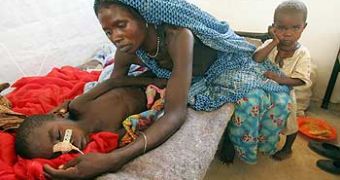You may have a healthy sexual life, but a simple mosquito bite could trigger something similar to AIDS. Especially if you're in Africa and have never had malaria before.
A new study points to the fact that a protein released by the malaria parasite can trigger an aggressive and horrendous type of cancer called Burkitt's lymphoma. Burkitt's lymphoma is rare in developed countries, but in equatorial Africa it accounts for most of the malignancies found in children, sometimes more than all other cancer types combined.
The patients experience excruciating sufferance: immune cells turn cancerous and develop tumors in the lymph nodes, inducing tongue swell and cheeks bulge, which disfigure the patients and impede them eat.
The condition turns fatal in parts of sub-Saharan Africa with limited health care.
The lymphoma is caused by the Epstein-Barr virus (EBV), which induces mononucleosis or glandular fever but the germ typically stays dormant, without inducing severe damages in the body after inserting itself into the host's DNA.
But the team led by Arnaud Ch?ne at the Karolinska Institute in Stockholm, Sweden, believes that a protein synthesized by the malaria parasite, named CIDR1, could reactivate the EBV.
Lab tests showed that that cells tested positive for the Epstein-Barr virus showed within three days five times more EBV if exposed to CIDR1 and the number of the immune cells doubled. It seems that CIDR1 can reactivate the Epstein Barr virus, which induces a massive overproduction of immune cells triggering lymphoma.
The discovery also explains why in equatorial Africa, Burkitt's lymphoma appears especially in children. "If you get malaria first [before the Epstein-Barr virus], then you acquire some immunity to malaria after that. So if you are exposed again the parasite cannot stimulate the overproduction of cells that leads to lymphoma," suggests co-author Qijun Chen.
Burkitt's lymphoma can be cured with chemotherapy and antibody therapy, but getting the treatment is tricky "since 99% of children with the tumor live in rural settings, often miles away from roads," said pediatrician John Phillips. "One way to reduce the number of cases of Burkitt's lymphoma might be to intensify efforts to curb the malaria epidemic.", Ch?ne said.

 14 DAY TRIAL //
14 DAY TRIAL //